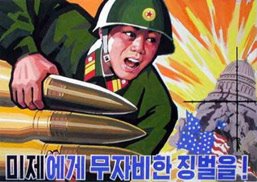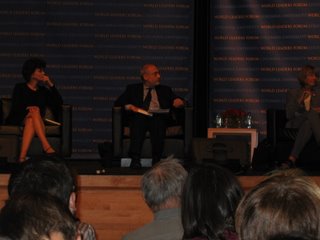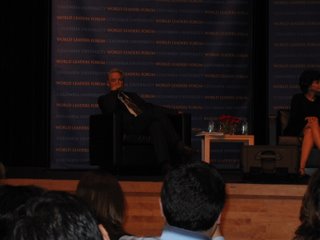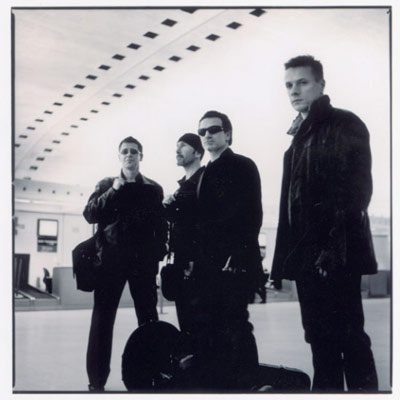
I’m back in New York City now, I arrived in town yesterday. Classes start tomorrow, and I’m basically already signed up for everything I’m going to take. (The trick here at this school is to sign up for everything you think you’re going to take, and then drop the extra classes once you’ve made your final choice.)
Had a good vacation, all in all. Got to rest, got to relax, got to see friends, just got to chill out. My time in California, I’ve already talked about. In Seattle, honestly, I didn’t “do” much. It is my hometown after all; many of the things one would do if they were from out of town, I’ve already done previously. Besides, the priority was really just seeing friends & family, which I did have ample time for. A bit part of it all was just the sense of getting to kick back & relax, not having my calendar as jam packed as it tends to be during the school year. I didn’t schedule much while I was in Seattle, other than seeing friends. And the friends I did get to see, it was great. Even though some things have changed, much of it remains the same, and it really was outstanding to get to see people. About the only thing I didn’t get to do was finish ‘Brothers Karamazov’, which was my summer reading project (my own, not for a class). I’m better than halfway through it though, and enjoying it immensely. I think I will be sad when I do finish it.
Two things about my trip are worth mentioning. I got to watch some great cinema while I was there. I’ve been building a list of movies I wanted to see for some time now, and I used the time I had while I was there to work my way through parts of the list. I’ll comment on a few (not all) of the more notable ones I saw.
Casablanca – If you’re going to watch ‘classic’ films, you might as well start with this one, right? Watched it and understood why people like it. Also understood, after watching it, where a lot of ‘classic’ Hollywood lines come from; they come from this movie. (Here’s looking at you kid, could be the start of a beautiful friendship, etc) Honestly, I had a hard time getting into it at first because I didn’t like Humphrey Bogart’s character. But by the time the end of the film rolls around, I realized he really was a pretty decent guy. I also liked how they resolved the movie at the end; after Rick pulls the gun on the inspector, I really wasn’t sure how things would turn out, given that this was classic Hollywood in that era so you knew Rick couldn’t die or get carted off to the concentration camps. All in all, really a great film, well acted, well shot. I can see why so many people like it so well after the fact.
Citizen Kane – So then, you have to watch the OTHER ‘greatest film of all time’, right? And this one, I didn’t care for, though I’m glad I can say I’ve seen it now. Frankly, the story isn’t all that great, though the real-life tie in to Hearst is interesting. (Apparently he offered RKO Studios $800,000 to destroy all copies of the film, and then had Welles blacklisted in Hollywood) From what I understand, this movie is a milestone on a technical level; several things were done with it, cinematically, that hadn’t been done before and heavily influenced all the films after it. But story-wise, it was lacking, although it was certainly well-acted.
Farewell My Concubine – OK, this movie was FANTASTIC. I’d been meaning to watch it for awhile, and wasn’t disappointed. This movie is classic of Chinese cinema, and is well worth the watch for anyone interested in foreign film. Gut-wrenching to watch at times as it follows the main characters through China’s turbulent years from 1910 or so till after the Cultural Revolution and a bit shocking at its portrayal of some things that generally aren’t shown in film here in the West (amputating a child’s fingers), it was extraordinarily moving. Also, I’ve basically fallen in love with Gong Li, who (for those who don’t know) is generally considered to be the finest Chinese actress of her generation; she was basically #1 before Zhang Ziyi, who played the main female character in Memoirs of a Geisha (and interestingly, Gong Li played her rival in that same film). She’s amazing, I’m going to go find a few of her other movies.
Les Miserables – This is one I probably wouldn’t have picked up on my own, but my younger brother Ben recommended it highly. After watching it, I’m not at all sorry that I did. Liam Neeson & Geoffery Rush were set against one another perfectly, they both inhabited those characters. I even liked Uma Thurman in it, who I don’t usually like. Very powerful, very moving, very well acted. Some people I’ve talked to say the play is better, but I certainly had no problems with this adaptation.
Phantom of the Opera – OK, for a long time, I had zero interest in seeing this. I knew it was a very popular musical, and I’d read that many people considered the film poor. Given that it was directed by Joel Schumacher, the same director who brought us such luminaries as Batman & Robin, I really had no interest.
Then my entire family watched it (on separate occasions) and recommended it to me. Especially given that my parents liked it, I figured I’d give it a go.
I’m so glad that I did. I still may go and see it on Broadway, but I think I’ll have a very hard time seeing any other actors in the roles of the Phantom and Christine, those two were perfectly cast. Very, very moving, I can see what people like about it so well.
*** Brief spoiler ahead *** However, I did find out that in the original book that both the movie and the play are based on, the Phantom dies at the end of the story, which I felt made much more sense. The rose at the end of the movie was a great sentimental touch, but it felt out of place. I mean come on, where is the Phantom going to go?
*** End spoiler ***The other notable thing that happened while I was home was golfing. At least sort of.
I’d been trying to think of something that I could do with my brothers Mark & Ben while I was home that would be fun, inexpensive, and a bit outside the realm of what we’d usually do together. None of us golf, but going to a driving range and hitting a bucket of balls seemed like it could be a good time. I decided to press for it and they were amiable, so we went.
And actually had a fantastic time. It really was fun, and we were all of us basically terrible. We did hit some of the balls pretty well, all of us got a couple of shots to the far end of the range (out to 200+ yards) but I’d say half our balls didn’t even make it past 50. We were laughing so hard watching each other shoot we had to stop sometimes. Ben even broke the driver he was using; I watched his ball fly out onto the range followed directly behind by the head of the driver. (They told him in the clubhouse that driver was already cracked) It would be hard to explain exactly why we had so much fun, I can only say that we did. It reminded me a lot of the golfing scene in that old movie Navy Seals with Charlie Sheen, we were purely horsing around, probably horrifying the serious golfers who were there to practice their technique, and we couldn’t have been having more fun.
A special note of thanks goes to my two brothers. Ben let me stay with him most of the time while I was there, and also went out of his way to help with some behind the scenes things in order to make my stay more enjoyable. Mark also let me use his car while I was there, which saved me a ton of time & made some things possible that otherwise might not have been. For Ben’s above and beyond efforts, for Mark’s graciousness, and for both their hospitality, I am grateful.
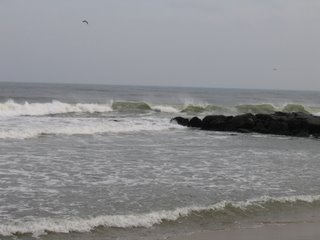 This weekend, I had the chance to go out to the ocean in New Jersey for the first time, and I had a blast. I went out overnight on Friday with a group of people from the church I go to (Redeemer Presbyterian) for a weekend getaway at a bed & breakfast. It was nice mostly just to be able to go and relax, get out of town for a little while, but the highlight for me was definitely the ocean itself.
This weekend, I had the chance to go out to the ocean in New Jersey for the first time, and I had a blast. I went out overnight on Friday with a group of people from the church I go to (Redeemer Presbyterian) for a weekend getaway at a bed & breakfast. It was nice mostly just to be able to go and relax, get out of town for a little while, but the highlight for me was definitely the ocean itself. 